My Spanish Exchange
I am sorry that I am only posting an update now, but would you believe, I am actually so busy after school that I don’t have time to properly sit down and write. But, here is last week and the weekend that followed. This week’s adventures should be posted around Sunday.
Monday morning I missed my bus – twice. I don’t know how it happened. I have this amazing little app that tells you how far the bus is from your stop and somehow I didn’t get there in time in both instances. Luckily the wait is only around seven or eight minutes. As I was waiting for the bus I was admiring the pink sky I hadn’t seen before, because it was still dark when I wait for my bus at the usual time. I craned my neck to see if I could catch a glimpse of the rising sun as it came out between the blocks of flats that was Montecarmelo.
As I was doing that I became aware of other people who had joined me at the stop. One of them was a man and his little girl. He was maybe 45, but she couldn’t have been older that 4 or 5. And as I stood there waiting for my bus I watched the most beautiful display of the love between a father and his daughter I have ever seen first hand. Although it was quite chilly and she was wrapped up in a thick padded jacket, she was playing around him as if it were summer and the sun was shining. She would run around him and peek up at him where she stood behind his legs. As soon as he looked down, she would let out a squeal of laughter and peek out from the other side. And so she continued. I took my earphones out of my ears, just to listen to her laugh as it rang off the pavement in the early morning air. In a life that could be become so monotonous so very quickly when you were in a city where all the buildings, buses and cars looked the same, the innocent laughter of a child could place you in a different dimension, even if it was just for a few minutes.
And then, just to top off my “living in another dimension for a while”, as I was settling myself in on the bus when it finally came, we rounded a corner and I had a moments full view of the sunrise and the morning sky – with its many coloured palette, stretching from yellow to a dark cobalt – over Madrid. I though to myself, “If every morning I’m late it looks like this, I will definitely make an effort to be late more.”
But then I was plunged right back into the dreary life of a scholar having to get back to school. In the end I was about 15-20 minutes late for school and decided to go hang out in the library and do some translation work, instead of walking into class late and having everybody look at me. I was also developing a cold, which I wasn’t very happy about. I had been determined to not be another exchange student who had gotten sick in their first month of exchange. My immune system had a better reputation than that. But, alas, by Wednesday I was going through a 10 pack of tissues a day – and that was at school alone!
I got the right bus Tuesday morning, but was sad to see no spectacular sky. It didn’t do much to give me strength to face the day, or the two tests I had to write. One was Geography, and one was Lengua (aka Spanish). I wrote Geography first and was a bit dejected when I realised that half of what I’d studied wasn’t going to be asked. I had (tried to) studied(y) two chapters, but this test was only on the first one, and it was in depth. So, armed with the biggest English-Spanish Dictionary I have ever seen I began to write on mostly general knowledge alone. And we all know how good mine is! (Grappie). Lengua was much the same, although I finished much faster because I knew less work than I did for Geography.
Monday and Tuesday were also the first time I had to run to catch the bus home. That was quite thrilling and made me feel like Tris having to catch the Dauntless train, although not as much was at stake here.
Wednesday also started off rather strange. I got on the bus, but noticed my classmates weren’t on it. And as I got to class 20 minutes later, the hallway was deserted. I gingerly opened the door to find only three other people there. Turns out our Lengua prof wasn’t coming to school today and we had the first period off. How fortunate. That gave me a whole hour to translate/study some History, as I was writing (apparently) a big ass test the next day. In Historia del Arte the teacher was also absent, so my desk mate took the chance to teach me some History I hadn’t been in class for. To give you some perspective, they were writing on 6 chapters (temas). I had been in class for two. That alone was 25 A4 pages, printed on both sides. So, actually 50 pages, with paragraphs on paragraphs of information of the history of Spain between 1807 and 1868. Obviously I can’t translate all of that, study it and then translate what I’d studied back to Spanish. So, I took a shortcut. I read Wikipedia articles on the time period, studied that and used the dictionary the next day to translate all my knowledge into Spanish. It takes quite a while, but I was still done half and hour before everyone else (although I did write on only a third of the work).
Thursday night was definitely the highlight of my work week. I went to choir for the first time! Now, anyone that knows me personally knows I love to sing and having barely opened my mouth in two weeks to do just that had taken it’s toll on me, without me even realising it.
Some background; my host-mother, Queca, sings in a kind of “community choir”, made up out of people who live in and around Montecarmelo. I hadn’t known this when I asked her if she knew of a choir nearby I could join. She immediately told me that I should come with her when they had a practice, which was on a Thursday and a Saturday. And so I went. I asked her if it was okay if I waltzed in there without an audition and she nodded vigorously, seeing no problem. Everyone was very welcoming and friendly and I immediately felt at home. This was familiar territory. I knew how to stand in a semi circle around a piano and listen to my fellow sopranos. Even if they gave the instructions in Spanish, singing was singing, the language didn’t matter. We started off by doing some choir aerobics, also very familiar. Then we went onto breathing exercises. I had done some of these before, but not to the same extent. For the first time ever I could say that I was tired after breathing. And then onto scales and voice warm-ups. Everything was do-able.
The only thing bothering me was the lack of a director. Queca had described him to me, so I knew what I was looking for; a man and his name was Jesus (pronounced with a hard “ge” and then “-soes”) I kept looking around to see and on one such occasion I did spot a man that wasn’t singing, but walking around the semi circle, listening. He had curly black hair, a black beard and dark eyes. I laughed to myself and said: “Imagine if that is Jesus! He looks just like Him!”
To my surprise and amusement, this man indeed turned out to be Jesus our director.
We finished warming up and then the sheet music came out and I was presented with a song in German that the choir was to learn. I can’t described how thankful I was. Not only was it easy to sight read the notes, but I could pronounce all the words without much difficulty, unlike my fellow choir members, who approached each syllable with with a Spanish mindset. At one point while we were singing, I though I was at the wrong place because I didn’t recognise any of the words anyone was singing, but it turned out their accents was rendering the German unrecognisable. In Spanish they don’t have a hard a hard “r” like we do in Afrikaans, neither do they have an “h”. All their “h’s” are silent. Furthermore they say their “j’s”like we would our hard “g’s” and the other way around. Their “z’s” are also pronounced “th”, so imagine them trying to sing “Wachet auf, ruft uns die Stimme, der Wächter sehr hoch auf der Zinne,” with each second syllable having a hard sound in they’ve never heard of. I was basically just singing German in an Afrikaans accent, and somehow that was fine.
Jesus repeatedly stopped us, all the while shouting in rapid Spanish. Queca translated as well as she could. It wasn’t serious shouting, he just couldn’t understand why, after we had practised the pronunciation of the words without singing, the moment we started, we sang it all wrong again. Other occasions he would stop us was when we went flat at the end of a long phrase, scooped to get a high note or didn’t keep our mouths pouted enough and also went flat. Each time this happened I just smiled to myself and remembered having the exact same problems back in La Rochelle. It doesn’t matter if you are on another continent, with a choir, your battles will always be tantamount.
At the end of the night I was feeling revitalised, having opened my mouth once again and been able to sing. I realised then and there that I would always need to belong to a choir, or else I might just go out of my mind. As we were saying goodbye to everyone, the most German looking Spaniard I had seen up to then approached me. He was tall, had striking blue eyes and his white beard had traces of blonde in it.
“So, you are from South Africa, then?” he asked. His English accent was also very unlike anything I’d ever heard before.
“Sí, Ciudad del Cabo.” (I always try to reply in Spanish.)
“Ah, sí, Table Mountain and wine!”
“Sí! Lots of wine!” I laughed.
“Yes, I have some very nice wine from South Africa. You see, I go there often.”
“Veridad?” (“Really?”) I continued listening.
“Sí. It is very good. Now, just tell me your name again.”
“Mart-Marié.”
“Sí. And tell me, is your family from the boureh?”
I looked at him for a moment trying to comprehend what he had just said.
“Boureh,” he repeated.
“Oh, oh, boere! Yes, sí, boere! Sí, sí! How did you know?”
“I know a lot about the history. About the Anglo-Boureh war, general Boutha, de La Rey…” he trailed off.
“Veridad?” I was too surprised to say anything else. Here was this Spanish man who could rattle off the names of famous Afrikaner generals in a war fought 115 years ago. If my grandfather had still been alive I would have definitely introduced the two.
Friyay was also a very nice start to my weekend. At five in the afternoon my host-dad drove me through to Collado Vilalba. There I would spend the night with another exchange student, who lives with Rotarians, before going on a Rotary excursion the next day to Salamanca. When we arrived I met Alli Kravig from Wisconsin and later Nahla from Indonesia also joined us. The three of us had a sleepover that night, each of us telling the others a bit about our country (me more than them, I think!).
We were up early the next morning to get on the train to take us
7. Some singing and a trip to Salamanca
January 31, 2016
|
Madrid, Salamanca - Spain
I am sorry that I am only posting an update now, but would you believe, I am actually so busy after school that I don’t have time to properly sit down and write. But, here is last week and the weekend that followed. This week’s adventures should be posted around Sunday.
Monday morning I missed my bus – twice. I don’t know how it happened. I have this amazing little app that tells you how far the bus is from your stop and somehow I didn’t get there in time in both instances. Luckily the wait is only around seven or eight minutes. As I was waiting for the bus I was admiring the pink sky I hadn’t seen before, because it was still dark when I wait for my bus at the usual time. I craned my neck to see if I could catch a glimpse of the rising sun as it came out between the blocks of flats that was Montecarmelo.
As I was doing that I became aware of other people who had joined me at the stop. One of them was a man and his little girl. He was maybe 45, but she couldn’t have been older that 4 or 5. And as I stood there waiting for my bus I watched the most beautiful display of the love between a father and his daughter I have ever seen first hand. Although it was quite chilly and she was wrapped up in a thick padded jacket, she was playing around him as if it were summer and the sun was shining. She would run around him and peek up at him where she stood behind his legs. As soon as he looked down, she would let out a squeal of laughter and peek out from the other side. And so she continued. I took my earphones out of my ears, just to listen to her laugh as it rang off the pavement in the early morning air. In a life that could be become so monotonous so very quickly when you were in a city where all the buildings, buses and cars looked the same, the innocent laughter of a child could place you in a different dimension, even if it was just for a few minutes.
And then, just to top off my “living in another dimension for a while”, as I was settling myself in on the bus when it finally came, we rounded a corner and I had a moments full view of the sunrise and the morning sky – with its many coloured palette, stretching from yellow to a dark cobalt – over Madrid. I though to myself, “If every morning I’m late it looks like this, I will definitely make an effort to be late more.”
But then I was plunged right back into the dreary life of a scholar having to get back to school. In the end I was about 15-20 minutes late for school and decided to go hang out in the library and do some translation work, instead of walking into class late and having everybody look at me. I was also developing a cold, which I wasn’t very happy about. I had been determined to not be another exchange student who had gotten sick in their first month of exchange. My immune system had a better reputation than that. But, alas, by Wednesday I was going through a 10 pack of tissues a day – and that was at school alone!
I got the right bus Tuesday morning, but was sad to see no spectacular sky. It didn’t do much to give me strength to face the day, or the two tests I had to write. One was Geography, and one was Lengua (aka Spanish). I wrote Geography first and was a bit dejected when I realised that half of what I’d studied wasn’t going to be asked. I had (tried to) studied(y) two chapters, but this test was only on the first one, and it was in depth. So, armed with the biggest English-Spanish Dictionary I have ever seen I began to write on mostly general knowledge alone. And we all know how good mine is! (Grappie). Lengua was much the same, although I finished much faster because I knew less work than I did for Geography.
Monday and Tuesday were also the first time I had to run to catch the bus home. That was quite thrilling and made me feel like Tris having to catch the Dauntless train, although not as much was at stake here.
Wednesday also started off rather strange. I got on the bus, but noticed my classmates weren’t on it. And as I got to class 20 minutes later, the hallway was deserted. I gingerly opened the door to find only three other people there. Turns out our Lengua prof wasn’t coming to school today and we had the first period off. How fortunate. That gave me a whole hour to translate/study some History, as I was writing (apparently) a big ass test the next day. In Historia del Arte the teacher was also absent, so my desk mate took the chance to teach me some History I hadn’t been in class for. To give you some perspective, they were writing on 6 chapters (temas). I had been in class for two. That alone was 25 A4 pages, printed on both sides. So, actually 50 pages, with paragraphs on paragraphs of information of the history of Spain between 1807 and 1868. Obviously I can’t translate all of that, study it and then translate what I’d studied back to Spanish. So, I took a shortcut. I read Wikipedia articles on the time period, studied that and used the dictionary the next day to translate all my knowledge into Spanish. It takes quite a while, but I was still done half and hour before everyone else (although I did write on only a third of the work).
Thursday night was definitely the highlight of my work week. I went to choir for the first time! Now, anyone that knows me personally knows I love to sing and having barely opened my mouth in two weeks to do just that had taken it’s toll on me, without me even realising it.
Some background; my host-mother, Queca, sings in a kind of “community choir”, made up out of people who live in and around Montecarmelo. I hadn’t known this when I asked her if she knew of a choir nearby I could join. She immediately told me that I should come with her when they had a practice, which was on a Thursday and a Saturday. And so I went. I asked her if it was okay if I waltzed in there without an audition and she nodded vigorously, seeing no problem. Everyone was very welcoming and friendly and I immediately felt at home. This was familiar territory. I knew how to stand in a semi circle around a piano and listen to my fellow sopranos. Even if they gave the instructions in Spanish, singing was singing, the language didn’t matter. We started off by doing some choir aerobics, also very familiar. Then we went onto breathing exercises. I had done some of these before, but not to the same extent. For the first time ever I could say that I was tired after breathing. And then onto scales and voice warm-ups. Everything was do-able.
The only thing bothering me was the lack of a director. Queca had described him to me, so I knew what I was looking for; a man and his name was Jesus (pronounced with a hard “ge” and then “-soes”) I kept looking around to see and on one such occasion I did spot a man that wasn’t singing, but walking around the semi circle, listening. He had curly black hair, a black beard and dark eyes. I laughed to myself and said: “Imagine if that is Jesus! He looks just like Him!”
To my surprise and amusement, this man indeed turned out to be Jesus our director.
We finished warming up and then the sheet music came out and I was presented with a song in German that the choir was to learn. I can’t described how thankful I was. Not only was it easy to sight read the notes, but I could pronounce all the words without much difficulty, unlike my fellow choir members, who approached each syllable with with a Spanish mindset. At one point while we were singing, I though I was at the wrong place because I didn’t recognise any of the words anyone was singing, but it turned out their accents was rendering the German unrecognisable. In Spanish they don’t have a hard a hard “r” like we do in Afrikaans, neither do they have an “h”. All their “h’s” are silent. Furthermore they say their “j’s”like we would our hard “g’s” and the other way around. Their “z’s” are also pronounced “th”, so imagine them trying to sing “Wachet auf, ruft uns die Stimme, der Wächter sehr hoch auf der Zinne,” with each second syllable having a hard sound in they’ve never heard of. I was basically just singing German in an Afrikaans accent, and somehow that was fine.
Jesus repeatedly stopped us, all the while shouting in rapid Spanish. Queca translated as well as she could. It wasn’t serious shouting, he just couldn’t understand why, after we had practised the pronunciation of the words without singing, the moment we started, we sang it all wrong again. Other occasions he would stop us was when we went flat at the end of a long phrase, scooped to get a high note or didn’t keep our mouths pouted enough and also went flat. Each time this happened I just smiled to myself and remembered having the exact same problems back in La Rochelle. It doesn’t matter if you are on another continent, with a choir, your battles will always be tantamount.
At the end of the night I was feeling revitalised, having opened my mouth once again and been able to sing. I realised then and there that I would always need to belong to a choir, or else I might just go out of my mind. As we were saying goodbye to everyone, the most German looking Spaniard I had seen up to then approached me. He was tall, had striking blue eyes and his white beard had traces of blonde in it.
“So, you are from South Africa, then?” he asked. His English accent was also very unlike anything I’d ever heard before.
“Sí, Ciudad del Cabo.” (I always try to reply in Spanish.)
“Ah, sí, Table Mountain and wine!”
“Sí! Lots of wine!” I laughed.
“Yes, I have some very nice wine from South Africa. You see, I go there often.”
“Veridad?” (“Really?”) I continued listening.
“Sí. It is very good. Now, just tell me your name again.”
“Mart-Marié.”
“Sí. And tell me, is your family from the boureh?”
I looked at him for a moment trying to comprehend what he had just said.
“Boureh,” he repeated.
“Oh, oh, boere! Yes, sí, boere! Sí, sí! How did you know?”
“I know a lot about the history. About the Anglo-Boureh war, general Boutha, de La Rey…” he trailed off.
“Veridad?” I was too surprised to say anything else. Here was this Spanish man who could rattle off the names of famous Afrikaner generals in a war fought 115 years ago. If my grandfather had still been alive I would have definitely introduced the two.
Friyay was also a very nice start to my weekend. At five in the afternoon my host-dad drove me through to Collado Vilalba. There I would spend the night with another exchange student, who lives with Rotarians, before going on a Rotary excursion the next day to Salamanca. When we arrived I met Alli Kravig from Wisconsin and later Nahla from Indonesia also joined us. The three of us had a sleepover that night, each of us telling the others a bit about our country (me more than them, I think!).
We were up early the next morning to get on the train to take us
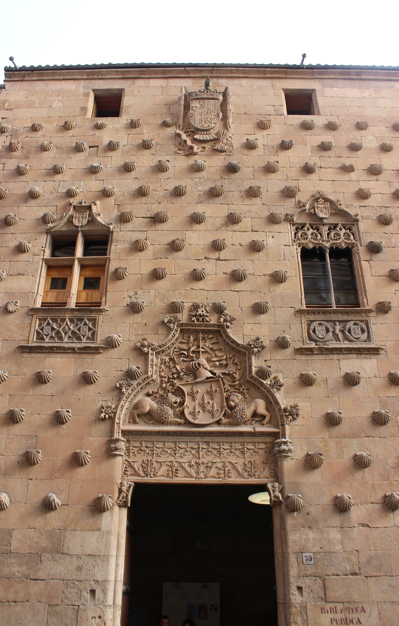
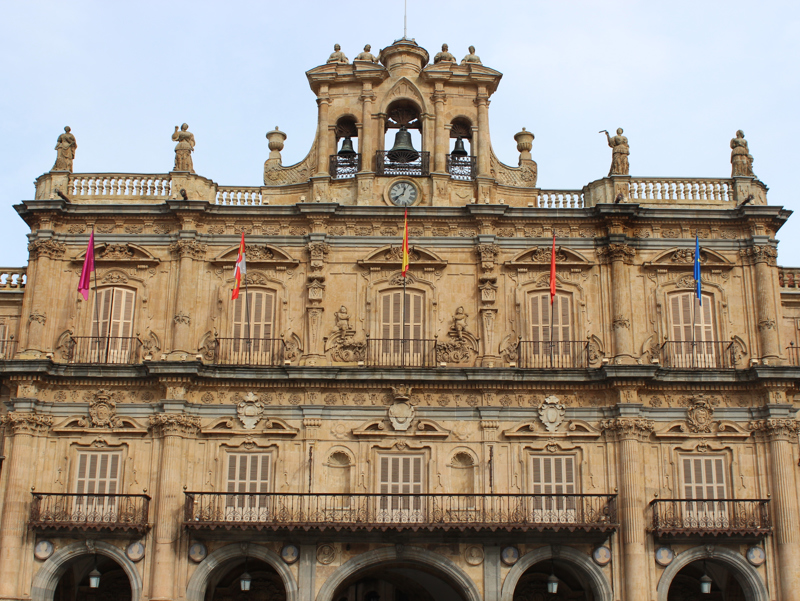
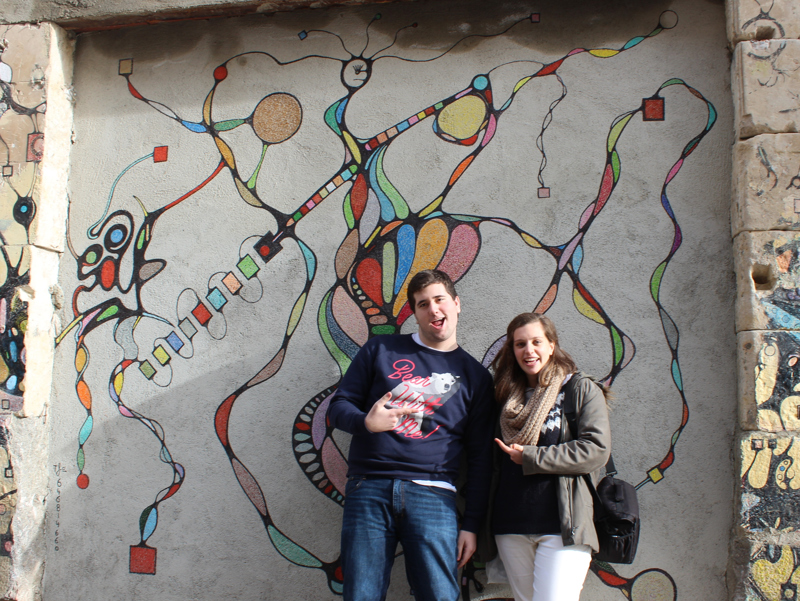
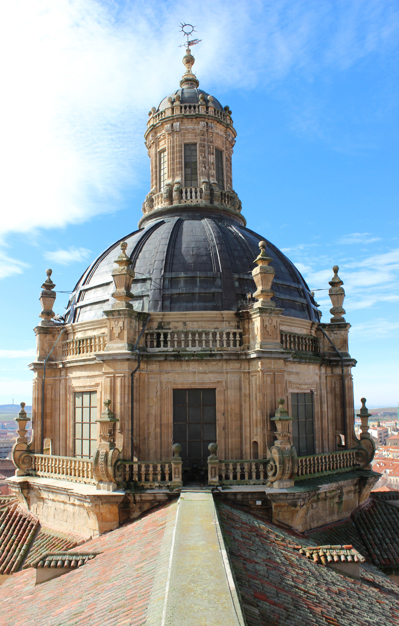
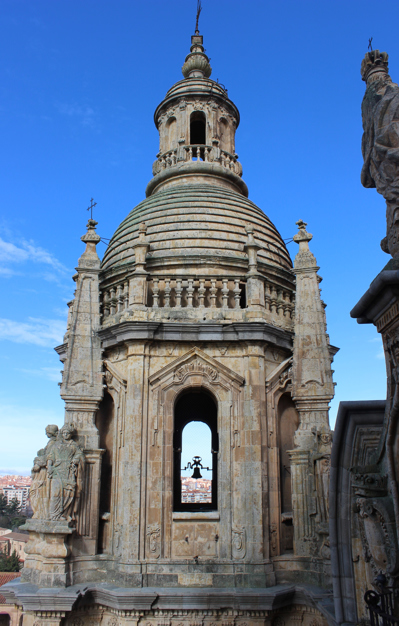
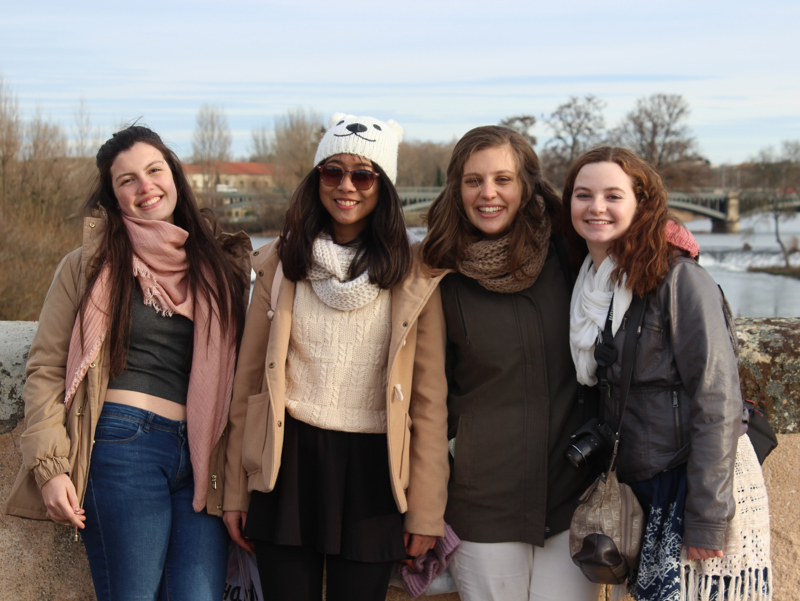
to Salamanca. Collado Vilalba is about a forty minute north westerly drive from Madrid, and Salamanca is another 3 hour train ride west. I finally realised my dream of a high speed train ride through the Spanish countryside, and it did not disappoint! On the train we met the other exchange students who had gotten on the train in Madrid already. On the long ride there I got to know them a little (the rest of them already knew one another). When we finally got to Salamanca we met another two students who had come on another train, also from the Madrid area. All in all we were thirteen students from five countries; nine Americans, one Brazilian, me the South African, one Indonesian and one Italian.
Salamanca was beautiful! It is a very old city, with buildings
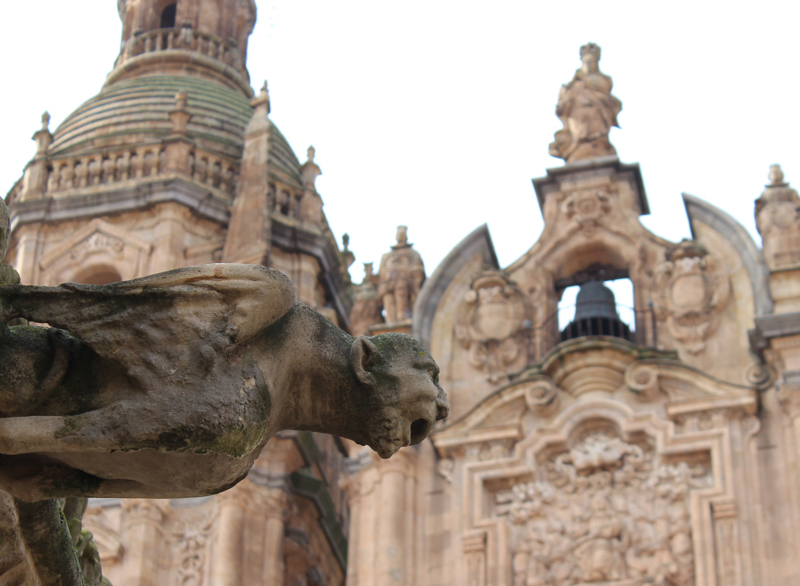
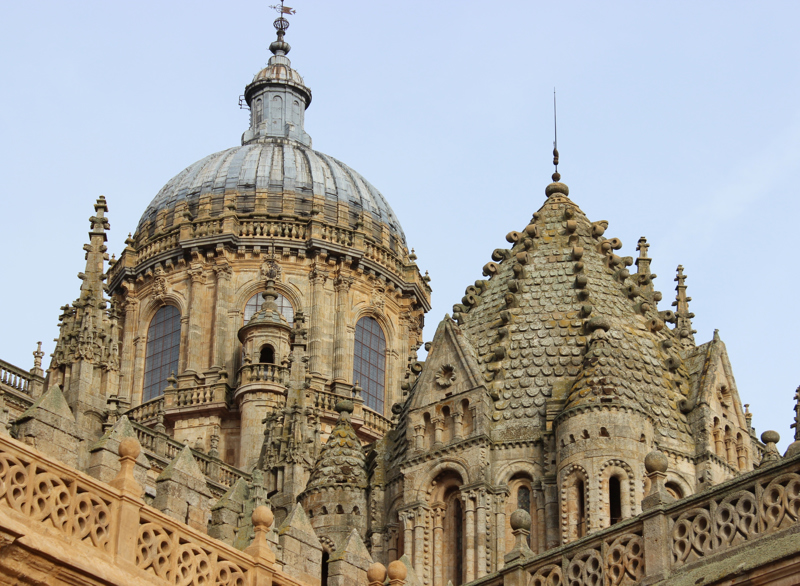
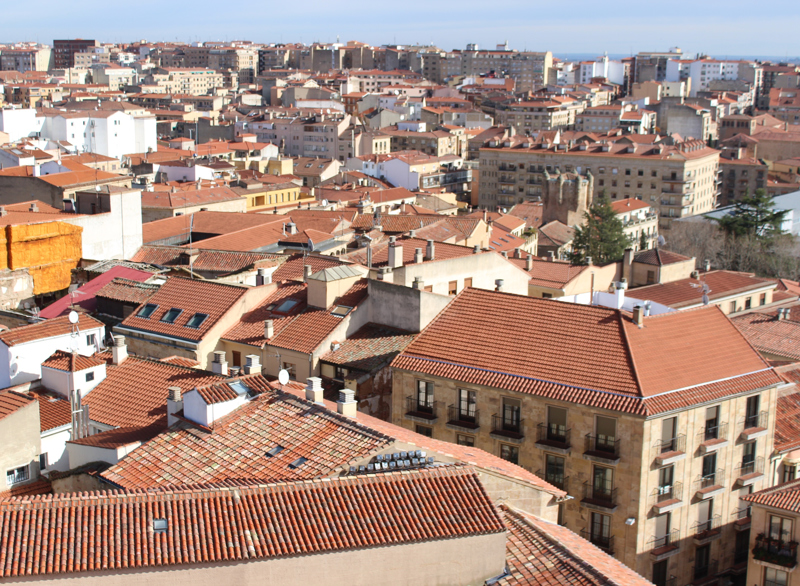
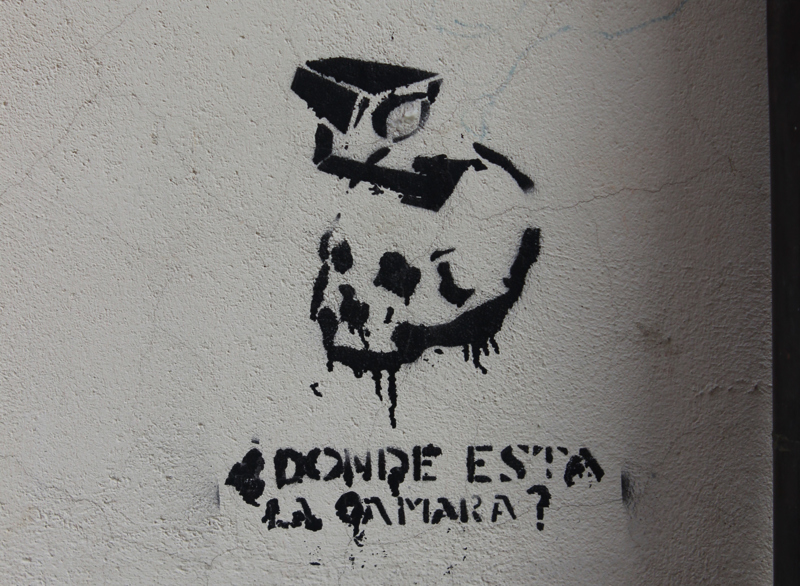
dating back from the middle ages. The city is famous for it’s university which was founded in 1218 and its two cathedrals, the Old Cathedral, of the 12th century and of Romanesque style, and the New Cathedral, much larger, built in the 16th century of Gothic style and completed in the 18th century (Thanks Wikipedia). Everywhere we went I saw tourist shops sell frog themed items and at first I thought that this was the city where the fable of the Princess and the Frog originated from, but I soon found out that this was not the case. One of the walls of a university building has a large detailed façade and the sculptor of this wall found it a good idea to sculpt a frog on top of one of the many skulls that are on the wall. And from there on it was thought to be good luck if you could find the frog. I have never in my life felt stupider as I stood in front of the wall for 20 minutes, looking for a frog. In the end, one of the exchange students who had been to Salamanca before had to show us where the frog was located. We all moaned and said that that was 20 minutes of our life wasted, but I know we all secretly enjoyed it. Other places we visited was the old cathedral, of which we went up into the towers of and had a beautiful view of the stretched out city. Across the road is the House of Shells (which is now the public library). So, not only do we have sculptors who sculpt frogs, but the architect of this house decided to adorn the outside of this house with over 400 scallop shells. Inside there is a courtyard from which you can see the towers of the next-door cathedral. The courtyard also has frightening looking gargoyles, some rendered less scary because of their missing noses, gently eaten away by wind and water erosion through the ages. We also took a walk through Salamanca’s Plaza Mayor and walked a ways over the 1000 year old bridge that spans across the Rio Tormes.
At the end of the day we were dead on our feet, and as the afternoon became cold, we sought shelter in a café which offered Hot Chocolate and churros. Now, this is something that needs to be explained in very definitive detail. In Spain they have everything you would have in South Africa: Nesquick, powdered hot chocolate, hot cocoa etc. But, something that was new to me was literal liquid chocolate. The first time this was explained to me, I was dumbfounded. That was legal? To drink melted chocolate? Turns out it was and they did it all the time. But it doesn’t stop there. With this thick, creamy, hot piece of heaven in your hands, you need something to eat. And what did the Spaniards invent? Churros. If I explain it in a South African context, it would be something like this; Imagine a deep fried donut without any toppings or glaze. No imagine it in the shape of a crinkle cut vienna sausage. That is a churro. But, once again, it doesn’t stop there. Now imagine taking that churro and rolling it in as much sugar as you want and dunking it in your liquid hot chocolate and then eating that. If this was readily available in Spain all the time, I wasn’t leaving anytime soon.
At around seven we caught our train back to Madrid and thus a very eventful day was behind us. Not that the weekend stopped there. I again slept over at Alli’s house and the next morning I was on the 9 o’clock train back to Madrid. I daresay this trip was even more beautiful than the one to Salamanca. It was a cloudy morning and as the train wound through the changing landscape the sun would peak through the clouds every now and then and play with the landscape, making something easily seen as plain, very beautiful.
That night we went to a Real Madrid football match. After we (finally) got everyone together and got our seats, the game turned out to be a bit of a let down, seeing as Real Madrid won 6-0. At least I got to see Cristiano Ronaldo in full glory and spend time with the other exchange students.
Cheers to a great week!
1.
1. Before I go
2.
2. Flying out
3.
3. First day of school
4.
4. The weekend in Guadarrama
5.
5. Madrid and the World in one weekend
6.
7. Some singing and a trip to Salamanca
7.
8. Almost missing the bus
8.
9. A typical day in the life of and some other observations
9.
10. Exploring Madrid some more
10.
11. Kom ons verkeer bietjie akademies.
11.
12. Take me to church... and Burgos
12.
13. Semana Santa
13.
14. El Camino
14.
15. Lasts
15.
16. Verano
16.
17. Last time around
17.
18. Las Navidades
Share your travel adventures like this!
Create your own travel blog in one step
Share with friends and family to follow your journey
Easy set up, no technical knowledge needed and unlimited storage!